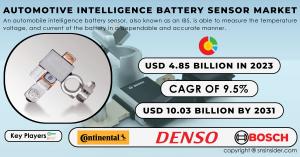ARTICLE AD BOX
Automotive Intelligence Battery Sensor Market Size, Share, Industry Analysis and Forecast 2024-2031.
— SNS Insider
AUSTIN, TEXAS, UNITED STATES, April 16, 2024 /EINPresswire.com/ — The Automotive Intelligence Battery Sensor Market, according to the SNS Insider report, reached a value of USD 4.14 Billion in 2023. Looking ahead, the market is projected to reach a staggering USD 9.90 Billion by 2031, reflecting a robust compound annual growth rate (CAGR) of 11.5% during the forecast period from 2024 to 2031.
An automobile intelligence battery sensor (IBS) plays a critical role in monitoring a vehicle’s battery health and performance. This sensor accurately measures key parameters like temperature, voltage, and current. By analyzing this data, the IBS provides valuable insights into the battery’s state of charge, state of function (power capabilities), and state of health (age). This real-time information allows the vehicle’s energy management system to optimize battery performance and extend its lifespan. IBS also plays a crucial role in early detection of potential battery issues, preventing unexpected breakdowns and enhancing overall vehicle safety. The IBS typically connects directly to the vehicle’s electrical system using the established Local Interconnect Network (LIN) protocol.
𝐃𝐨𝐰𝐧𝐥𝐨𝐚𝐝 𝐒𝐚𝐦𝐩𝐥𝐞 𝐏𝐃𝐅 𝐨𝐟 𝐀𝐮𝐭𝐨𝐦𝐨𝐭𝐢𝐯𝐞 𝐈𝐧𝐭𝐞𝐥𝐥𝐢𝐠𝐞𝐧𝐜𝐞 𝐁𝐚𝐭𝐭𝐞𝐫𝐲 𝐒𝐞𝐧𝐬𝐨𝐫 𝐌𝐚𝐫𝐤𝐞𝐭 @ https://www.snsinsider.com/sample-request/2160
𝐋𝐞𝐚𝐝𝐢𝐧𝐠 𝐊𝐞𝐲 𝐏𝐥𝐚𝐲𝐞𝐫𝐬 𝐨𝐟 𝐀𝐮𝐭𝐨𝐦𝐨𝐭𝐢𝐯𝐞 𝐈𝐧𝐭𝐞𝐥𝐥𝐢𝐠𝐞𝐧𝐜𝐞 𝐁𝐚𝐭𝐭𝐞𝐫𝐲 𝐒𝐞𝐧𝐬𝐨𝐫 𝐌𝐚𝐫𝐤𝐞𝐭
Continental AG (Germany)
NXP Semiconductors (Netherlands)
Robert Bosch GmbH (Germany)
HELLA GmbH and Co. KGaA (Germany)
DENSO CORPORATION (Japan)
Inomatic GmbH (Germany)
AMS AG (Austria)
Furukawa electric co. ltd. (Japan)
Vishay Intertechnology Inc. (U.S.)
MTA S.p.A. (Italy)
𝐒𝐞𝐠𝐦𝐞𝐧𝐭 𝐀𝐧𝐚𝐥𝐲𝐬𝐢𝐬
The automotive intelligence battery sensor market splits into segments based on voltage, technology, and vehicle type. Currently, 12-volt sensors reign supreme in traditional gasoline vehicles. However, 14-volt options are poised for growth due to start-stop technology. The commercial vehicle market utilizes 24-volt sensors, while 48-volt options are gaining traction in mild hybrids for better fuel efficiency. Technology-wise, cost-effective LIN sensors dominate, but CAN is expected to rise for complex battery systems. The Motor Control Unit (MCU) segment is also growing as advanced battery management integrates within the MCU itself. Finally, passenger cars lead the market due to production volume, while commercial vehicles are catching up for improved efficiency and regulation compliance.
𝐈𝐦𝐩𝐚𝐜𝐭 𝐨𝐟 𝐑𝐮𝐬𝐬𝐢𝐚-𝐔𝐤𝐫𝐚𝐢𝐧𝐞 𝐖𝐚𝐫
The ongoing conflict between Russia and Ukraine is expected to have a moderate impact on the automotive intelligence battery sensor market. Disruptions in the supply chain for key raw materials and components used in IBS production, coupled with rising energy costs, could lead to temporary price fluctuations and production delays. However, the long-term growth prospects of the market remain positive, driven by the aforementioned factors. Automakers may look for alternative suppliers to mitigate the impact of the war on their production schedules.
𝐌𝐚𝐫𝐤𝐞𝐭 𝐒𝐞𝐠𝐦𝐞𝐧𝐭𝐚𝐭𝐢𝐨𝐧 𝐨𝐟 𝐀𝐮𝐭𝐨𝐦𝐨𝐭𝐢𝐯𝐞 𝐈𝐧𝐭𝐞𝐥𝐥𝐢𝐠𝐞𝐧𝐜𝐞 𝐁𝐚𝐭𝐭𝐞𝐫𝐲 𝐒𝐞𝐧𝐬𝐨𝐫
𝐁𝐲 𝐕𝐨𝐥𝐭𝐚𝐠𝐞:
12 Volt
14 Volt
24 Volt
48 Volt
𝐁𝐲 𝐓𝐞𝐜𝐡𝐧𝐨𝐥𝐨𝐠𝐲:
LIN
CAN
MCU
𝐁𝐲 𝐕𝐞𝐡𝐢𝐜𝐥𝐞 𝐓𝐲𝐩𝐞:
Passenger cars
Commercial vehicles
𝐁𝐲 𝐑𝐞𝐠𝐢𝐨𝐧
North America
Europe
Asia-Pacific
The Middle East & Africa
Latin America
𝐅𝐨𝐫 𝐌𝐨𝐫𝐞 𝐂𝐮𝐬𝐭𝐨𝐦𝐢𝐳𝐞𝐝 𝐃𝐚𝐭𝐚, 𝐑𝐞𝐪𝐮𝐞𝐬𝐭 𝐟𝐨𝐫 𝐑𝐞𝐩𝐨𝐫𝐭 𝐂𝐮𝐬𝐭𝐨𝐦𝐢𝐳𝐚𝐭𝐢𝐨𝐧 @ https://www.snsinsider.com/enquiry/2160
𝐈𝐦𝐩𝐚𝐜𝐭 𝐨𝐟 𝐄𝐜𝐨𝐧𝐨𝐦𝐢𝐜 𝐒𝐥𝐨𝐰𝐝𝐨𝐰𝐧
An economic slowdown can potentially dampen the growth of the automotive intelligence battery sensor market. Consumers may delay discretionary purchases like new vehicles, leading to a decline in overall vehicle production. This, in turn, could impact the demand for IBS. However, the long-term outlook remains optimistic. Stringent emission regulations and the growing popularity of EVs and HEVs are expected to continue driving the market forward, even in an economic downturn. Furthermore, cost reductions and technological advancements in IBS are expected to make these sensors more affordable, potentially mitigating the impact of an economic slowdown on market growth.
𝐊𝐞𝐲 𝐑𝐞𝐠𝐢𝐨𝐧𝐚𝐥 𝐃𝐞𝐯𝐞𝐥𝐨𝐩𝐦𝐞𝐧𝐭𝐬
The global automotive intelligence battery sensor market can be broadly categorized into four key regions: North America, Europe, Asia-Pacific, and the Rest of the World. The Asia-Pacific region is anticipated to witness the most significant growth during the forecast period. This is primarily due to the exponential expansion of the automotive sector in countries like India, China, and Japan. The growing demand for fuel-efficient vehicles in these countries, particularly in the passenger car and commercial vehicle segments, will fuel the demand for IBS. Additionally, government initiatives promoting electric vehicle adoption and stricter emission regulations in these regions will further propel the market forward.
𝐏𝐮𝐫𝐜𝐡𝐚𝐬𝐞 𝐓𝐡𝐢𝐬 𝐄𝐱𝐜𝐥𝐮𝐬𝐢𝐯𝐞 𝐑𝐞𝐬𝐞𝐚𝐫𝐜𝐡 𝐑𝐞𝐩𝐨𝐫𝐭 @ https://www.snsinsider.com/checkout/2160
𝐊𝐞𝐲 𝐓𝐚𝐤𝐞𝐚𝐰𝐚𝐲𝐬 𝐟𝐨𝐫 𝐀𝐮𝐭𝐨𝐦𝐨𝐭𝐢𝐯𝐞 𝐈𝐧𝐭𝐞𝐥𝐥𝐢𝐠𝐞𝐧𝐜𝐞 𝐁𝐚𝐭𝐭𝐞𝐫𝐲 𝐒𝐞𝐧𝐬𝐨𝐫 𝐌𝐚𝐫𝐤𝐞𝐭 𝐒𝐭𝐮𝐝𝐲
The rising adoption of electric and hybrid vehicles, coupled with stringent emission regulations, is driving significant growth in the automotive intelligence battery sensor market.
Growing consumer demand for improved vehicle safety and performance is another key driver.
Technological advancements and cost reductions in IBS are expected to further accelerate market expansion.
The Asia-Pacific region is anticipated to be the fastest-growing market due to the booming automotive sector and government initiatives promoting electric vehicles.
𝐑𝐞𝐜𝐞𝐧𝐭 𝐃𝐞𝐯𝐞𝐥𝐨𝐩𝐦𝐞𝐧𝐭𝐬
Bosch, a leading industry player, has unveiled its latest advancements in battery sensor technology. These advancements promise enhanced accuracy and real-time monitoring capabilities, enabling more efficient battery management.
Continental AG has introduced innovative solutions focused on optimizing energy management within electric vehicles. These solutions aim to improve overall battery efficiency and extend battery life, further highlighting the importance of intelligent battery sensors in the EV market.
𝐓𝐚𝐛𝐥𝐞 𝐨𝐟 𝐂𝐨𝐧𝐭𝐞𝐧𝐭- 𝐌𝐚𝐣𝐨𝐫 𝐏𝐨𝐢𝐧𝐭𝐬
1. Introduction
2. Research Methodology
3. Market Dynamics
4. Impact Analysis
5. Value Chain Analysis
6. Porter’s 5 forces model
7. PEST Analysis
8. Automotive Intelligence Battery Sensor Market Segmentation, By Voltage
9. Automotive Intelligence Battery Sensor Market Segmentation, By Technology
10. Automotive Intelligence Battery Sensor Market Segmentation, By Vehicle Type
11. Regional Analysis
12. Company Profiles
13. Competitive Landscape
14. Conclusion
Continue….
𝐀𝐜𝐜𝐞𝐬𝐬 𝐓𝐡𝐢𝐬 𝐅𝐮𝐥𝐥 𝐑𝐞𝐬𝐞𝐚𝐫𝐜𝐡 𝐑𝐞𝐩𝐨𝐫𝐭 𝐰𝐢𝐭𝐡 𝐂𝐡𝐚𝐫𝐭𝐬 𝐚𝐧𝐝 𝐆𝐫𝐚𝐩𝐡𝐬 @ https://www.snsinsider.com/reports/automotive-intelligence-battery-sensor-market-2160
𝐀𝐛𝐨𝐮𝐭 𝐔𝐬:
SNS Insider is one of the leading market research and consulting agencies that dominates the market research industry globally. Our company’s aim is to give clients the knowledge they require in order to function in changing circumstances. In order to give you current, accurate market data, consumer insights, and opinions so that you can make decisions with confidence, we employ a variety of techniques, including surveys, video talks, and focus groups around the world.
𝐂𝐨𝐧𝐭𝐚𝐜𝐭 𝐔𝐬:
Akash Anand – Head of Business Development Strategy
Email: info@snsinsider.com
Phone: +1–415–230–0044 (US) | +91–7798602273 (IND)
Akash Anand
SNS Insider Pvt. Ltd
+1 415-230-0044
info@snsinsider.com
Visit us on social media:
Facebook
Twitter
LinkedIn
Instagram
YouTube
![]()
The content is by EIN Presswire. Headlines of Today Media is not responsible for the content provided or any links related to this content. Headlines of Today Media is not responsible for the correctness, topicality or the quality of the content.
The post Automotive Intelligence Battery Sensor Market Projected to Reach US$ 9.90 BN by 2031, Driven by Vehicle Electrification appeared first on Headlines of Today.
.png)
 1 year ago
4
1 year ago
4

 ,
,







 English (US)
English (US)